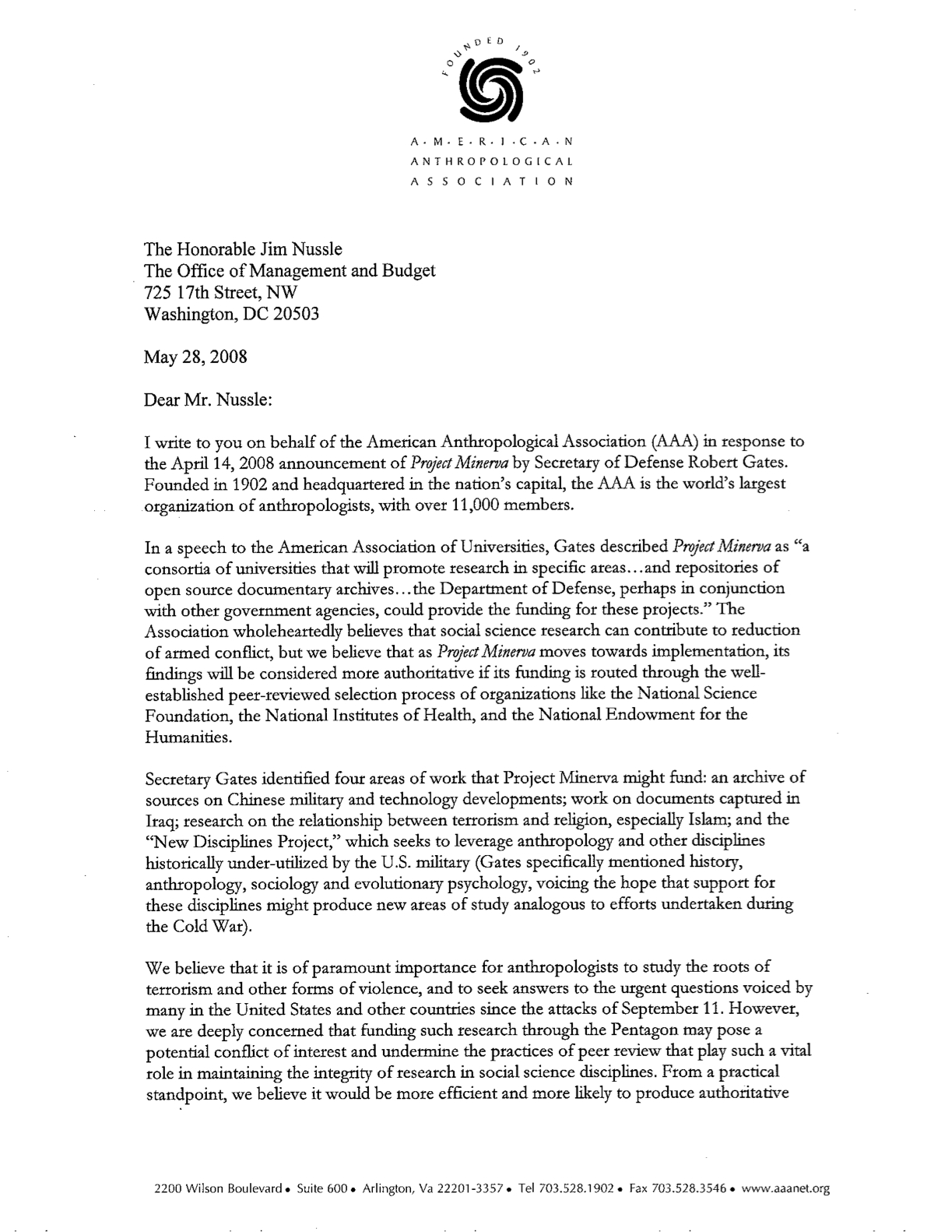Below I append a statement issued today by AAA President Setha Low in response to the defense department’s Project Minerva. AAA is making the rather clever suggestion that projects funded through Minerva be subjected to peer review through established federal channels and agencies, such as NSF, NEH, and NIH. Low writes: “Lacking the kind of of infrastructure for evaluating anthropological research that one finds at these other agencies, we are concerned that the Department of Defense would turn for assistance in developing a selection process to those who are not intimately familiar with the rigorous standards of our discipline.” This statement in particular appears to voice one worry or criticism that many have articulated about the ‘culturing-up’ of the US security apparatus: that it is being done in a shoddy way. It further raises the issue of formal procedures concerning ethical oversight, since, presumably, NSF, NEH, and NIH all require strict adherence to common rule guidelines. (Though we know that DoD also requires this.)

Page two after the jump…

The Pentagon seems to have come to a similar position (independently?)
http://www.insidehighered.com/news/2008/05/28/minerva
Thanks for the link. The IHE story is interesting, and does seem to suggest that DoD may have come to this conclusion independently. I wonder if we know whether other academic groups (in addition to AAA) have been responding to the Minerva story and in what fashion.
I thought it was interesting that “peer review” is the argument Low (and by extension the AAA?) chose to stand on. It’s a good argument, one I’ve been making for a long time, but it’s only one among several. The principles stated in the Code of Ethics, especially the strong 1970s Code, seem to provide several other areas for regulation and concern, none of which the Pentagon seems prepared to regulate: informed consent, meaningful consent (which I’m now considering as something entirely different from informed consent), avoiding harm to subjects, etc.
The Pentagon’s rethinking of this should make me a lot more comfortable than it does. Ultimately, it seems to me that the Pentagon has their own goals, and it’s an organization that generally tends to achieve its goals. But I think they are savvy to the implications of another PR disaster like Camelot. The very suggestion of a wide-scale concerted investment in social science research by the military suggests the return of a Cold War style psych ops/propaganda kind of foreign policy, ostensibly with terrorism replacing Soviet communism as the evil force we’re “protecting” our client nations from. As before, intellectuals in client nations get verrrry nervous when our military starts looking too closely into their everyday cultures and “national character”.
In addition to the issues Oneman highlights, I think we need also look at the militarization of academic research that Minerva represents.
Given the HTS program, the dismissal by some of AAA’s statement concerning it (see this DoD press conference transcript on the subject: http://www.defenselink.mil/DODCMSShare/BloggerAssets/2008-05/05070811525420080507_DrMahnken_transcript.pdf) and tragic death of the of the first, and we can only hope the last, of its social scientist members (http://humanterrainsystem.army.mil/Bhatia%20News.htm), it would behoove us to wrestle a bit more deeply with the implications of a program like this.
Speaking as an anthropologist currently wrapping up a year of fieldwork with soldiers and veterans for my dissertation about the “War on Terror”; I agree anthropological voices have much to contribute here, but I feel strongly that we need not take DoD money or accept DoD agendas to do so.
Plus, given the defensive and even paranoid self protective stance so pervasive in the military and broader defense community (not to mention the Pentagon’s single mindedness which Oneman hints at), I’d guess they’ve got their own ideas about academic freedom which we might find hard to recognize.